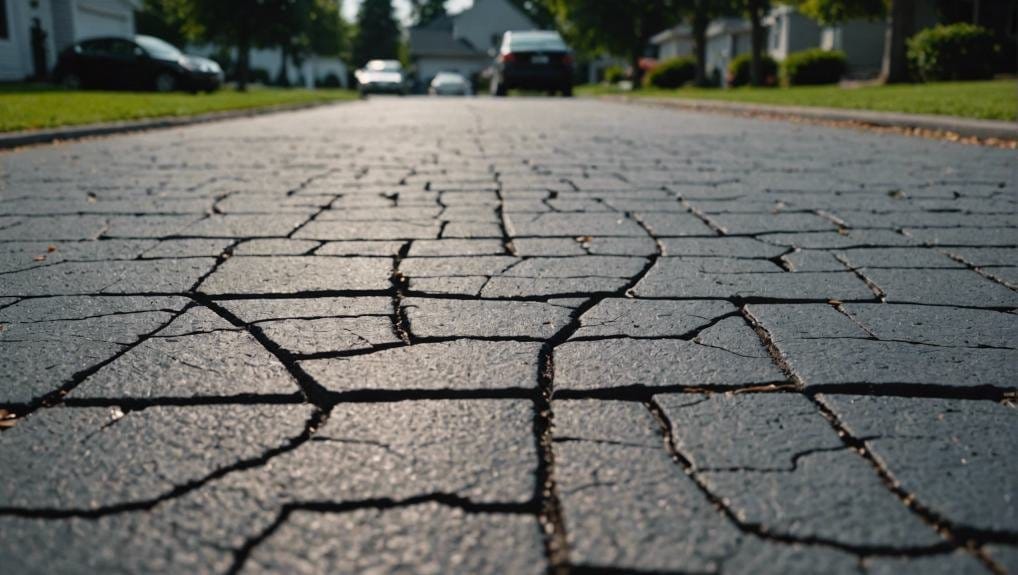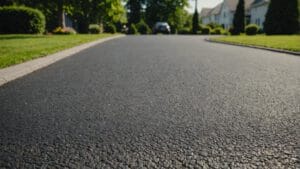When installing driveways, avoid common mistakes. Use high-quality asphalt to prevent early cracking. Properly grade the subgrade to avoid water pooling. Ensure good compaction for durability. Allow concrete to cure fully for strength. Don’t rush the sealing process; wait for full curing. These steps guarantee a long-lasting driveway that withstands heavy loads and diverse weather conditions.
Key Takeaways
- Opt for high-quality asphalt materials to prevent early cracking and degradation.
- Employ accurate subgrade grading techniques to avoid water pooling and erosion.
- Ensure proper compaction of layers for durability and strength.
- Allow sufficient curing time for concrete driveways to prevent cracking.
- Avoid rushing the sealing process; wait for full curing before applying high-quality sealer.
Using Low-Quality Asphalt
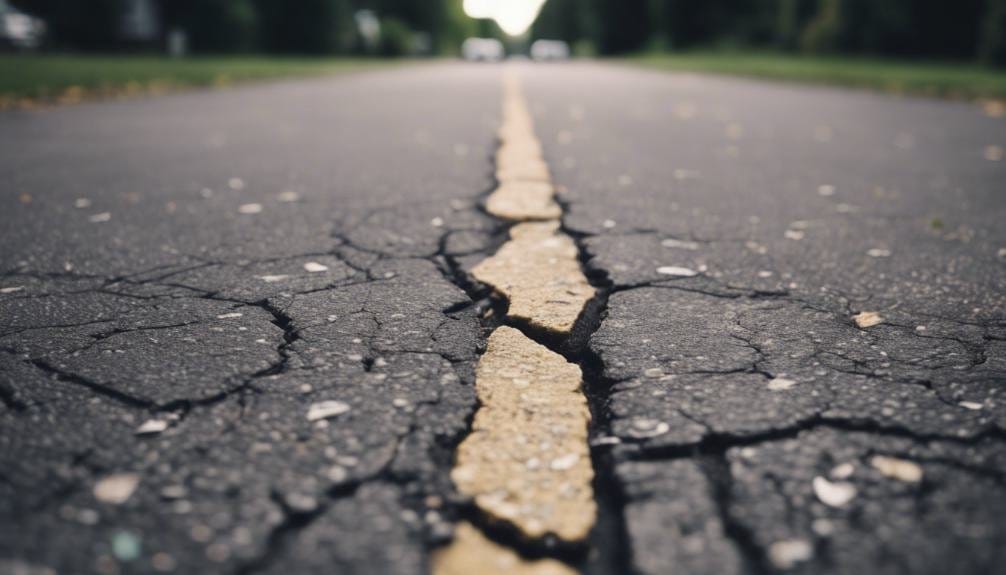
When installing driveways, avoid using low-quality asphalt as it compromises the durability and longevity of the surface. Opting for high-quality materials is important for driveway longevity. High-quality asphalt consists of durable aggregate and binder materials that are essential for resisting cracking and damage. Properly sized and shaped aggregate, combined with a reliable binder, guarantee that the driveway surface can withstand various weather conditions and heavy loads over time.
Using low-quality asphalt can result in early cracking and degradation, leading to the need for premature repairs. To prevent such issues, it’s important to invest in high-quality asphalt materials right from the start. Choosing contractors based on the quality of the asphalt mix they use can have a significant impact on the overall lifespan of your driveway. By prioritizing the use of high-quality materials, you can avoid costly repairs and replacements in the future, ensuring a durable and long-lasting driveway for years to come.
Improper Grading of Subgrade
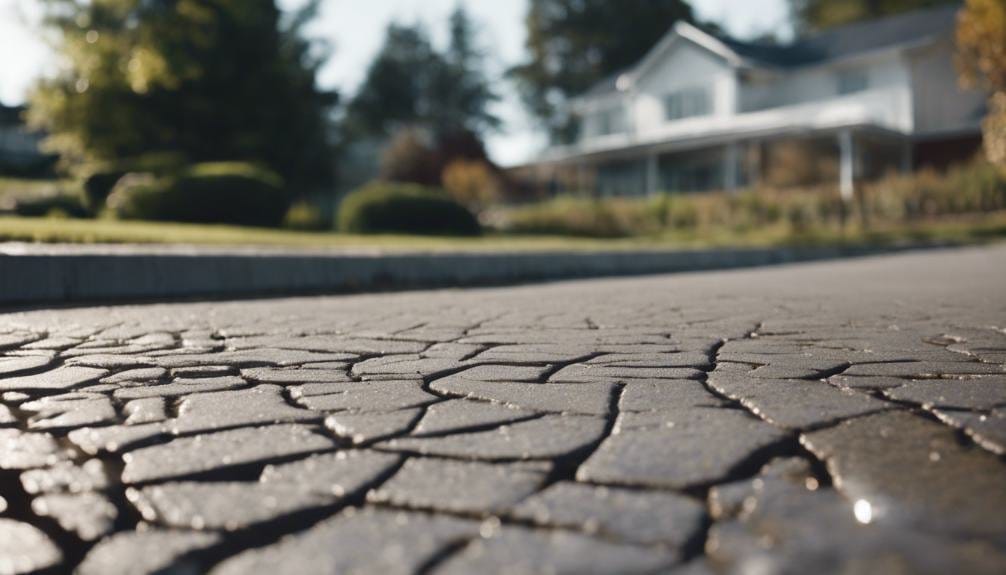
Improper grading of the subgrade can lead to uneven surfaces, water pooling, and potential damage to your driveway. To guarantee a stable and well-draining driveway surface, it’s essential to employ proper subgrade grading techniques. Factors such as transverse and longitudinal grade, smoothness, and cross slope must be carefully considered during the grading process. Accurate grading using machinery operated by experienced contractors is vital for achieving a durable driveway.
When the subgrade is improperly graded, water pooling can occur, leading to erosion and deterioration of the driveway surface over time. To avoid these issues, consult professionals who can provide guidance on the correct subgrade grading techniques for your specific project. By investing time and attention into proper grading practices, you can prevent future headaches and enjoy a long-lasting, resilient driveway.
Poor Compaction of Layers
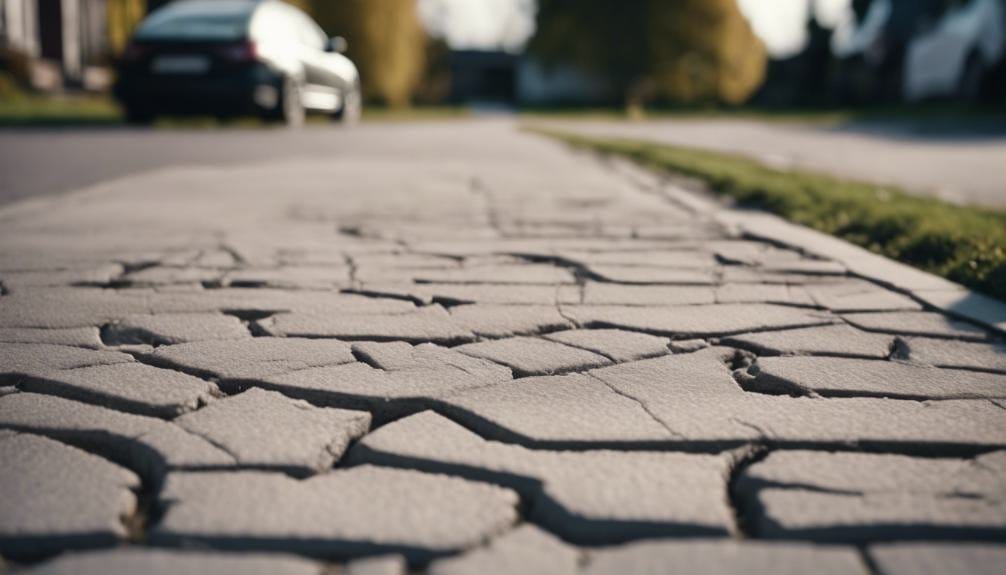
Proper compaction of layers is essential for ensuring the durability and strength of your driveway. When the layers are not adequately compacted, air bubbles can remain trapped, reducing the density of the material and compromising the overall support the driveway can provide. Inadequate compaction also leads to the formation of voids, affecting the structural integrity and drainage capabilities of the surface. To achieve the best density during compaction, it is vital to make sure the soil layers are thin and the asphalt temperature is within the appropriate range. Self-propelled compactors are commonly employed to achieve the required compaction levels effectively. Remember, investing in proper compaction is a cost-effective strategy to prolong the lifespan of your asphalt driveway.
| Compaction | Importance | Tips |
|---|---|---|
| Removes air | Increases density | Use correct |
| bubbles | Enhances strength | asphalt temperature |
| Supports | Aids in drainage | Ensure thin soil |
| heavy loads | Prevents voids | layers |
| Cost-effective | Extends lifespan | Use compactors |
Insufficient Curing Time
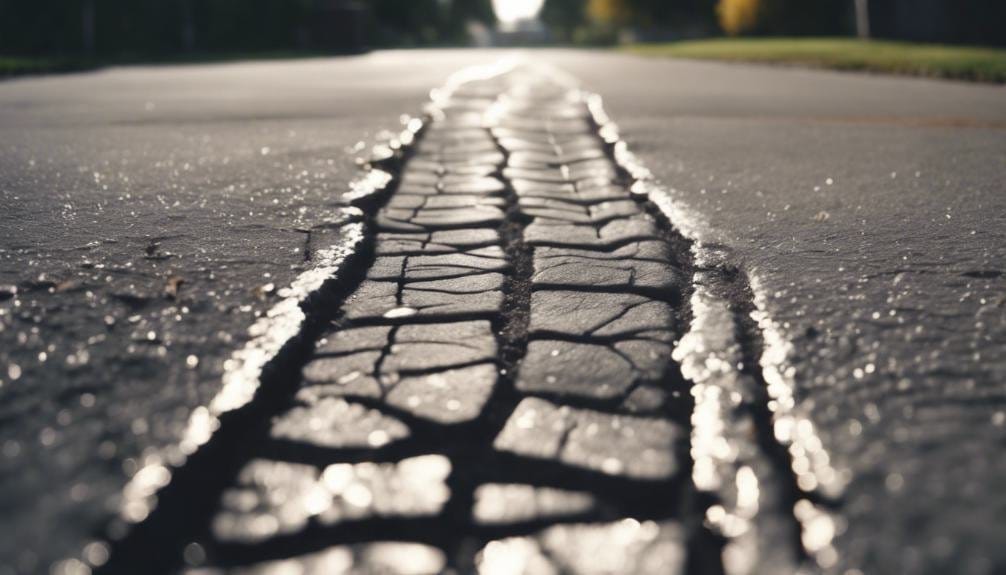
Insufficient curing time greatly weakens the concrete driveway, risking structural integrity and longevity. Important curing is essential for the concrete to reach its intended strength and durability. Concrete driveways typically require around seven days to cure fully, although this timeframe can fluctuate depending on various factors.
If the curing process is cut short, the concrete may not attain the necessary strength, making it susceptible to cracking and other structural issues over time. It’s imperative to adhere to the manufacturer’s recommendations for curing to guarantee the driveway’s stability and longevity. Neglecting the curing phase or rushing through it can have a significant impact on the overall quality of the driveway.
Therefore, allowing adequate time for the concrete to cure properly during the installation process is essential for a durable and long-lasting driveway.
Rushed Sealing Process
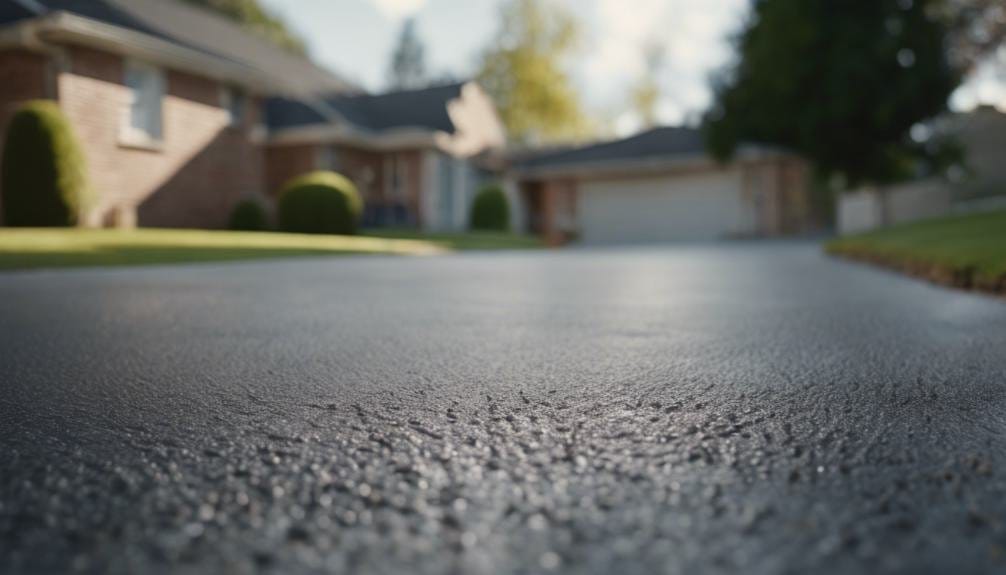
Rushing through the sealing process of your driveway can greatly compromise its durability and appearance. Sealing is essential for protecting asphalt driveways from UV rays and water damage, ultimately enhancing their longevity. To guarantee the effectiveness of the sealant, it’s important to wait for a period of 3 months to 1 year, allowing the driveway to fully cure before applying the sealant. Neglecting this waiting period can lead to premature wear and tear, impacting the overall quality of the driveway.
Proper timing is key when it comes to sealing your driveway. Waiting for the appropriate duration ensures that the sealant can provide optimal protection against the elements, preserving the integrity of the asphalt surface. It’s recommended to use a high-quality driveway sealer with asphalt as a major component for increased durability and longevity. By following these steps and avoiding a rushed sealing process, you can maintain the appearance and structural integrity of your driveway for years to come.
Neglecting Proper Drainage Planning
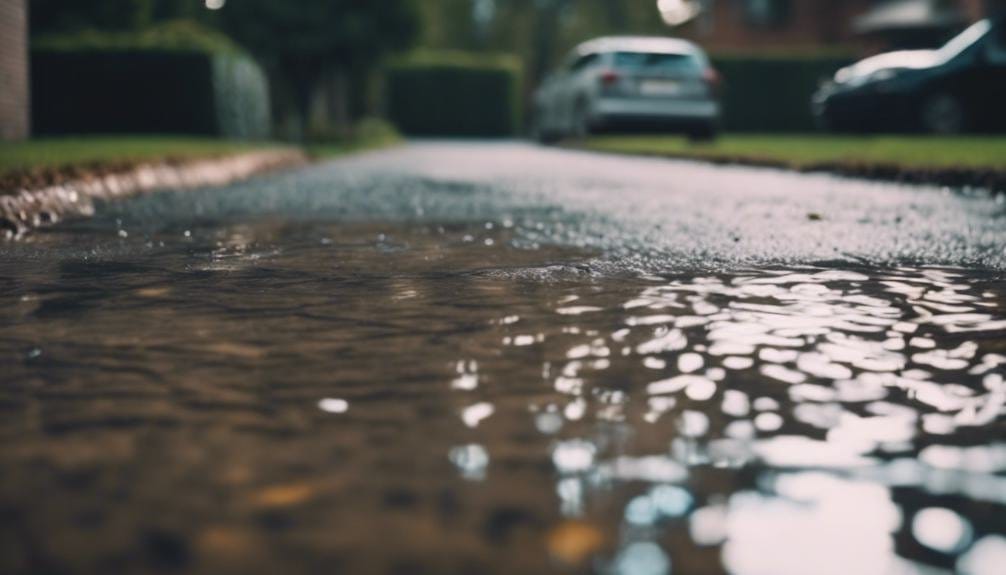
Neglecting adequate planning for drainage can result in water pooling and damage to the driveway surface. Essential drainage planning is vital to prevent water seepage and maintain the integrity of the driveway. Proper drainage channels water away from the driveway, reducing the risk of erosion, cracking, and shifting.
One vital aspect of drainage planning is ensuring a slight slope away from the driveway to facilitate efficient water flow. This slope helps prevent water from accumulating on the surface and causing damage over time. Failure to take into account proper drainage during driveway installation can compromise its structural integrity and durability.
Lack of Professional Installation Services
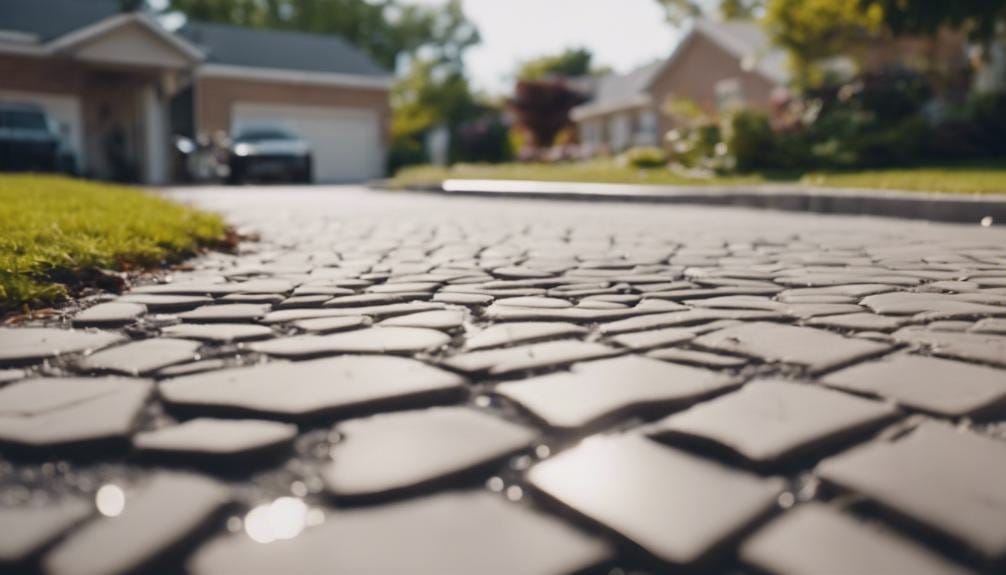
Professional installation services are vital for ensuring the proper grading, compaction, and curing of your driveway. Hiring experienced contractors for your driveway project is essential to avoid common pitfalls like poor drainage and insufficient reinforcement. To highlight the importance of professional installation, consider the table below:
| Benefits of Professional Installation |
|---|
| Ensures Proper Grading |
| Utilizes Quality Materials |
| Guarantees Long-lasting Results |
Conclusion
To sum up, when installing driveways, it’s important to avoid common mistakes such as using low-quality materials, improper grading, poor compaction, and rushed sealing.
Make sure to allow sufficient curing time, plan for proper drainage, and hire professional installation services to achieve a durable and long-lasting driveway.
Remember, a well-laid driveway isn’t just a pathway, but a solid foundation for your journey ahead.
